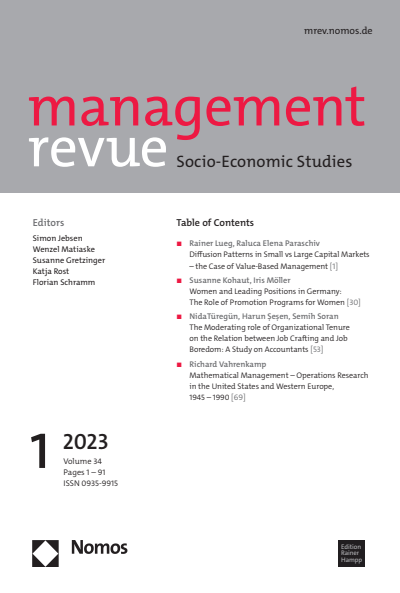Corporate Social Responsibility: A Fake Already According to the Theory of the Firm?Date submitted: October 4, 2017Revised version accepted after double blind review: August 31, 2018
IF 1.7
0 MANAGEMENT
引用次数: 1
Abstract
This paper asks if we can support by argument the norm “we should hold firms responsible”. From a critical rationalist perspective, answering this question has an ethical and an empirical dimension. The ethical dimension discusses whether we should hold firms socially responsible for ethical reasons. However, since demanding that we should hold firms responsible requires that we can hold them responsible, this paper focuses on this empirical dimension. Thus, this paper asks whether we can hold firms responsible for theoretical reasons. Theoretical reasons means that this paper refers to theories of the firm and in particular to their hypotheses about the behaviour of firms and firm members. The paper finds that the nexus of contracts approach (which is the economic mainstream theory of the firm) ascribes behaviour to the firm that corresponds to the firm members’ behaviour. In consequence, we would not have reasons to ascribe responsibility to the firm from a social science perspective. Since the nexus of contracts approach is not adequate from a critical rationalist perspective, however, this paper develops an extended corporate actors approach. In contrast to the nexus of contacts approach, the extended corporate actors approach ascribes behaviour to the firm that differs from firm members’ actions. Thus, we do have reasons to ascribe responsibility to the firm from a social science perspective.企业社会责任:从企业理论看是假的吗?提交日期:2017年10月4日;双盲评审后的改版:2018年8月31日
本文的问题是,我们是否可以通过论证来支持“我们应该让企业负起责任”这一规范。从批判理性主义的角度来看,回答这个问题有一个伦理和经验的维度。道德维度讨论的是我们是否应该让企业出于道德原因承担社会责任。然而,既然要求我们应该让企业承担责任,就要求我们能够让它们承担责任,因此本文将重点放在这个实证维度上。因此,本文提出了一个问题,我们是否可以从理论上追究企业的责任。理论原因意味着本文引用了企业理论,特别是它们关于企业和企业成员行为的假设。本文发现契约联系理论(企业经济学的主流理论)将与企业成员行为相对应的行为归因于企业。因此,从社会科学的角度来看,我们没有理由将责任归咎于企业。然而,由于契约关系方法从批判理性主义的角度来看是不充分的,因此本文发展了一种扩展的公司行为者方法。与联系关系方法相反,扩展公司行为者方法将不同于公司成员行为的行为归因于公司。因此,从社会科学的角度来看,我们确实有理由将责任归咎于企业。
本文章由计算机程序翻译,如有差异,请以英文原文为准。
求助全文
约1分钟内获得全文
求助全文
来源期刊

Management Revue
MANAGEMENT-
CiteScore
1.20
自引率
0.00%
发文量
7
期刊介绍:
Management Revue - Socio-Economic Studies is an interdisciplinary European journal that undergoes peer review. It publishes qualitative and quantitative work, along with purely theoretical papers, contributing to the study of management, organization, and industrial relations. The journal welcomes contributions from various disciplines, including business and public administration, organizational behavior, economics, sociology, and psychology. Regular features include reviews of books relevant to management and organization studies.
Special issues provide a unique perspective on specific research fields. Organized by selected guest editors, each special issue includes at least two overview articles from leaders in the field, along with at least three new empirical papers and up to ten book reviews related to the topic.
The journal aims to offer in-depth insights into selected research topics, presenting potentially controversial perspectives, new theoretical insights, valuable empirical analysis, and brief reviews of key publications. Its objective is to establish Management Revue - Socio-Economic Studies as a top-quality symposium journal for the international academic community.
 求助内容:
求助内容: 应助结果提醒方式:
应助结果提醒方式:


